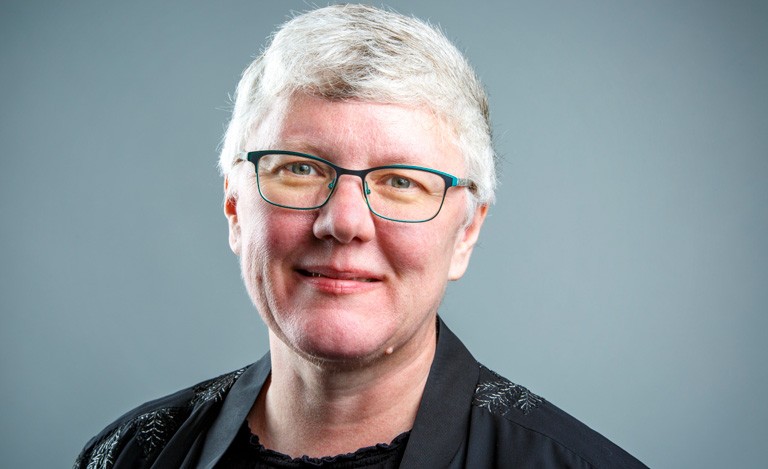Lynne Bowker builds on her university mandate with a 5-year Social Sciences and Humanities Research Council grant
 Lynne Bowker: "The library acted as an incubator for the Machine Translation Literacy project."
Lynne Bowker: "The library acted as an incubator for the Machine Translation Literacy project."When Lynne Bowker was researcher-in-residence at Concordia Library from June to December 2019, her project focused on machine translation literacy in the context of scholarly communication.
A professor at the University of Ottawa's School of Translation and Interpretation with a cross-appointment to the School of Information Studies, Bowker approached machine translation from an informed and critical perspective during her time at Concordia.
Now in its fourth year, the researcher-in-residence program supports the library's efforts to foster a strong research culture and promote evidence-based librarianship.
As part of her residency, Bowker conducted research with non-anglophone student and faculty participants from Concordia to understand how they were engaging with machine translation with respect to scholarly communication and how it could be improved.
Bowker says that the support she received during her tenure as researcher-in-residence had a direct influence on her ability to secure a five-year Social Sciences and Humanities Research Council (SSHRC) grant awarded in July 2020, valued at more than $77,000.
The grant is allowing Bowker to continue the Machine Translation Literacy project that she started during her residency at Concordia Library.
On November 27, Bowker was also inducted as a Fellow of the Royal Society of Canada for her recognized contributions to the rapidly evolving field of translation technologies.
'I was able to demonstrate to the SSHRC that the pilot project at Concordia would be a good investment to scale up'
Can you speak about your residency at Concordia Library?
Lynne Bowker: It was a chance to come and spend time at a new institution, where I met new people (staff, faculty and students) and got to bounce ideas around and be inspired by other perspectives.
My goal for the Machine Translation Literacy project was to find ways of reaching the broader student community and introduce them to the potential of machine translation for helping with academic writing. The library, which is a crosscutting unit that serves students in every program, provided an opening to reach that wider community.
My colleagues working in the library were so enthusiastic and supportive. In addition to one-on-one chats where I could seek advice or ask for help or introductions, I presented preliminary stages of the work at lunch-and-learn seminars and received feedback to make the subsequent stages stronger.
What areas in your project that began during your residency are advancing with the support of the SSHRC grant?
LB: In the six months that I was at Concordia, I was able to take a pilot project from conception through to completion, including an evaluation. I worked with Concordia librarians to develop and deliver workshops on machine translation literacy for the university community.
The library acted as an incubator for the Machine Translation Literacy project, and I'm so excited to see it grow.
Following the success of introducing machine translation literacy workshops in academic libraries like Concordia Library, the next steps were to expand this training to a wider public and offer pilot workshops that would be adapted to different types of users, potentially including public library patrons.
Of course, like most other projects that have been unfolding over the past year, COVID-19 did throw a bit of a wrench into the original plan, so I adapted and went in a bit of a different direction.
You have said that your research has potential to help others beyond the scholarly community. Is your current work achieving that goal?
LB: With the arrival of COVID-19, universities had to adapt quite quickly, and at my university, professors were encouraged to focus on teaching and to develop courses that could be taught online. In this context, I decided to propose two new courses aimed at a similarly broad audience as the Machine Translation Literacy workshops that I first developed during my residency at Concordia Library.
The first course is an introduction to translation for non-translators and it's open to students across the whole university, as well as the general public.
The second is also a first-year course and is open to students across the Faculty of Arts. It's an interdisciplinary course with a theme that changes from one year to the next. This year the theme is digital and information literacy in a crisis situation.
Starting with the workshops offered through Concordia Library and continuing with these various online courses that target non-translators, I believe that word is beginning to spread that translation does have a role and an impact on our lives. And one of the most common ways in which we encounter it is through machine translation, hence the importance of developing strong machine translation literacy skills.






